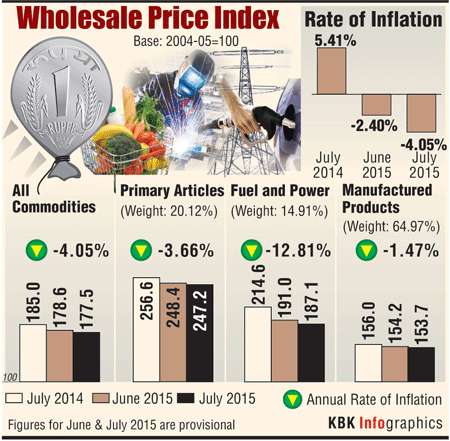 Deflationary trends continued for the ninth month in a row in July with wholesale inflation plunging to a historic low of (-)4.05 per cent on cheaper vegetable and fuel, which may prompt RBI to cut interest rate ahead of the September 29 policy meet.
Deflationary trends continued for the ninth month in a row in July with wholesale inflation plunging to a historic low of (-)4.05 per cent on cheaper vegetable and fuel, which may prompt RBI to cut interest rate ahead of the September 29 policy meet.
The WPI number follows retail inflation (CPI) data, which had slipped to a record low of 3.78 per cent in July.
The overall wholesale price index-based (WPI) inflation was (-)2.40 per cent in June, government data showed today.
It has been in the negative zone since November 2014. A year ago in July 2014, inflation was 5.41 per cent. During the month, pulses, milk, edible oil, egg, meat and fish turned dearer.
RBI Governor Raghuram Rajan after the monetary policy announcement on August 4 had said the central bank may cut interest rate even out of the policy cycle depending on how macroeconomic indicators play out.
"We are waiting for information. There was more need to move fast in the early stages of the turnaround. We will take all information into account and decide whether at times it warrants moving in between policy cycle or it does not," he had said after the policy meet.
RBI mostly tracks the consumer price inflation for its policy decision, and its next review is due on September 29.
Last month, rate of price rise for food items, especially rice, vegetables and fruits, eased at a wholesale level.
Overall wholesale inflation in the food category was (-)1.16 per cent compared with 2.88 per cent in June.
 Vegetable prices declined 24.52 per cent, with potato prices slumping 49.27 per cent. However, pulses got dearer by 35.75 per cent as against 33.67 per cent in the previous month.
Vegetable prices declined 24.52 per cent, with potato prices slumping 49.27 per cent. However, pulses got dearer by 35.75 per cent as against 33.67 per cent in the previous month.
Inflation in fuel and power category stood at (-)12.81 per cent in June.
The manufactured product index inflation was (-)1.47 per cent as against (-)0.77 per cent last month.
Prices eased for sugar, beverage, tobacco and tobacco products.
Prices of cotton textile also declined 4.63 per cent, and those of leather and leather products 2.43 per cent.
Since RBI wanted more clarity over inflation numbers in months to come, it kept policy rate unchanged during its policy review earlier this month.
RBI kept the repo rate, at which it lends to banks, unchanged at 7.25 per cent and the cash reserve ratio, the proportion of deposits banks have to park with the central bank, at 4 per cent.











 © 2025
© 2025